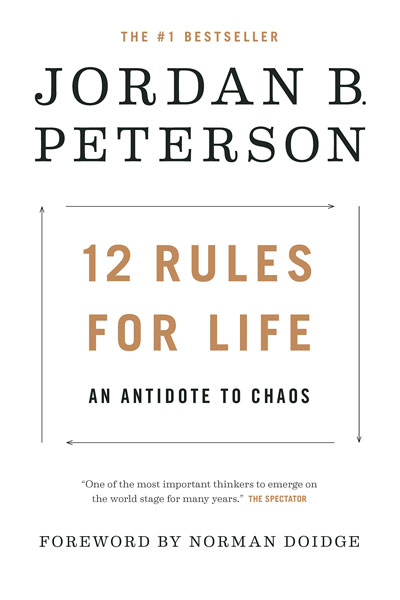

This article is an excerpt from the Shortform summary of "12 Rules for Life" by Jordan Peterson. Shortform has the world's best summaries of books you should be reading.
Like this article? Sign up for a free trial here .
In 12 Rules for Life, Rule #5 is “Do Not Let Your Children Do Anything That Makes You Dislike Them.” What does this mean? Why shouldn’t you let your children act like brats?
The ultimate point is that you have a responsibility to teach your child the rules of society. If you don’t, society will, in a much meaner way. Learn more about Jordan Peterson’s Rule 5.
Overview of Jordan Peterson’s Rule 5
Children aren’t born ready for life. This is partly a biological compromise with head size – too big of a head wouldn’t fit through a woman’s birth canal. This is also partly because much of human culture isn’t written in our genes – culture has developed faster than biological evolutionary cycles. Instead, as children age, they develop physically, and they also learn a lot about how the human world works.
This means children need training and feedback to understand how to navigate human society. If you’re a typical parent, you want your children to succeed, and helping your children become well-liked, functioning members of society is a key part of success.
According to Jordan Peterson’s Rule 5, children, curious and exploratory as they are, constantly test limits to figure out where the boundaries are. When they get corrective feedback, they understand where the boundary is. “I now know it’s not OK to throw food on the floor on a restaurant, because my mom yelled at me for it.”
Furthermore, while it’s tempting to think of them as cherubic angels, they have capacity for evil inside them. They will not bloom into perfection if left to their own devices. So if they hit you or yell in supermarkets, and you don’t provide corrective feedback, they’ll think it’s ok. They’ll learn the wrong boundaries of society. Then when they become adults, they’ll be poorly adjusted to function in broader society.
Parents Who Fail to Teach their Kids
Many parents, in a misguided effort to avoid damaging their child or wanting to be their child’s friend, avoid giving corrective feedback to their kids. These are the parents who let their kids curse at them in public or scream disruptively in movie theaters. These parents are teaching their kids the wrong boundaries of society, and in effect they’re outsourcing the training to society. “Here’s my kid – society, please teach him the right rules.”
The problem is that society doesn’t care about your child nearly as much as you do. If you dislike your own child at times, imagine how other people will react. Other people will swiftly judge and punish your child mercilessly, with nowhere near the tolerance and patience that you have for your child. Here are examples of how a poorly socialized child will be rejected by society:
- In school, other children will refuse to spend time around a temperamental, unsociable child.
- Teachers will run out of patience and focus attention on more pleasant children, causing your child to fall behind.
- Parents will refuse your child’s presence at their playtimes.
- If these habits persist into adulthood, employers will fire them; relationship partners will reject them.
According to Jordan Peterson’s Rule 5, you are your child’s best shot at teaching society’s rules. Society doesn’t have the patience to teach your child – there are many other well-adjusted, functioning people to spend time on. A bad kid will simply be rejected and left behind.
And this problem can get worse throughout a child’s life. An early poor social experience can set up a vicious cycle of chronic maladjustment – a maladjusted child will act poorly; she will receive negative feedback from the world, often without understanding why; she will withdraw and feel rejected, causing anxiety, depression, and resentment. This further receives negative feedback from the world. This can last for a lifetime.
According to 12 Rules for Life, shielding your child from corrective feedback is in effect crippling them in the long run. And early exposure matters – a child not taught to behave properly by age 4 will have lasting social difficulties.
Teach Your Child What’s Acceptable and What Isn’t
As a parent, your purpose is to serve as a proxy for society. You teach the child what is acceptable, and what isn’t.
Think not about having your child avoid all pain, but rather to maximize their learning at minimal cost. In other words, some amount of pain early on will save a lot of pain throughout the child’s life. Don’t protect your kids – make them as competent as you can.
According to Jordan Peterson’s Rule 5, teaching children the rules should be done with both rewards and punishment – leaving one out removes a tool from your toolkit (most parents omit punishment). Punishments and negative emotions are natural, evolved reactions to events – sadness and shame train people to avoid the situation that led to those painful emotions.
Also, a good reward program requires continuous vigilance, since the behavior needs to be reinforced quickly with the reward. The right reward structure doesn’t work if it’s not correctly applied continuously with the child.
In 12 Rules for Life, Peterson gives 4 principles for raising kids:
- Set the rules, but not too many.
- Some suggestions – don’t bite, kick, or hit. Don’t torture and bully other children. Eat in a civilized way, so other people are pleased to have you. Learn to share, so other kids will play with you. Pay attention when spoken to by adults, so they will feel eager to teach you. Be good company so that you’re invited to fun.
- Use the minimum necessary force. Escalate only if necessary.
- Start with a glare, then verbal admonishment, then a time out, then taking away belongings – escalating until they get the point.
- Physical punishment may be necessary, depending on the child.
- A patient adult can defeat a two-year-old, because time lasts forever when you’re two.
- When they comply, give them a reward, like a pat on the head or a compliment.
- Parenting is best done with a partner.
- Raising young children is demanding, and it’s easy for one parent to make a mistake. Another parent helps cover for the other and limit overreactions.
- Peterson acknowledges that single parents have an admirably difficult life, but we shouldn’t pretend that all family forms are equally good. Two good parents are better than one.
- Understand your own capacity for anger and revenge.
- You might think that you have infinite patience and love for your child, but you don’t – not if your child dominates you.
- If you don’t discipline your child, you’ll start resenting your child. A vicious cycle can result where you punish them subtly (eg don’t show them attention), which then breeds resentment in the child, which causes them to seek vengeance more aggressively, which causes you to resent them more, and so forth. Before you know it, your family has a schism that’s hard to repair.
———End of Preview———

Like what you just read? Read the rest of the world's best summary of "12 Rules for Life" at Shortform . Learn the book's critical concepts in 20 minutes or less .
Here's what you'll find in our full 12 Rules for Life summary :
- Why standing up straight will make people treat you differently
- How to find meaning in your life and work
- Why you're lying to yourself without realizing it






